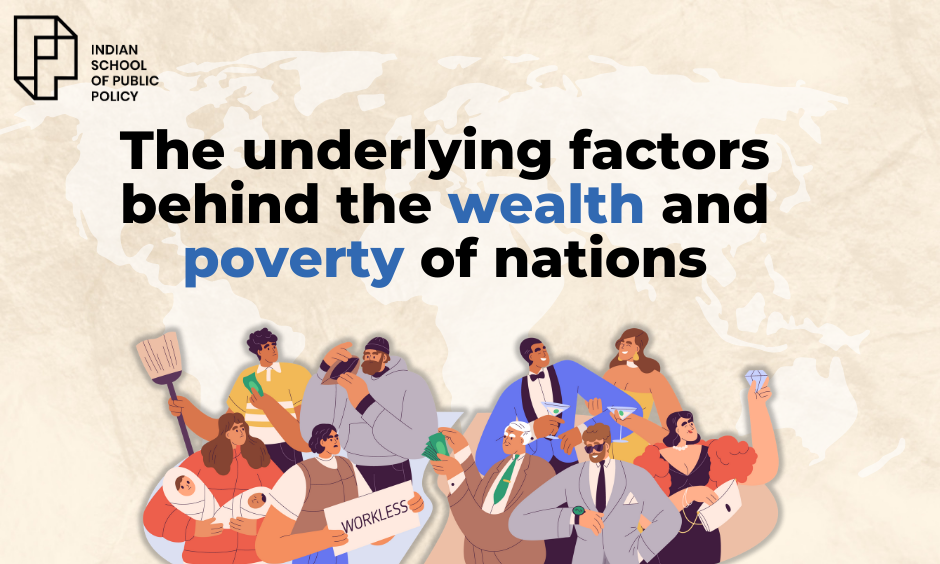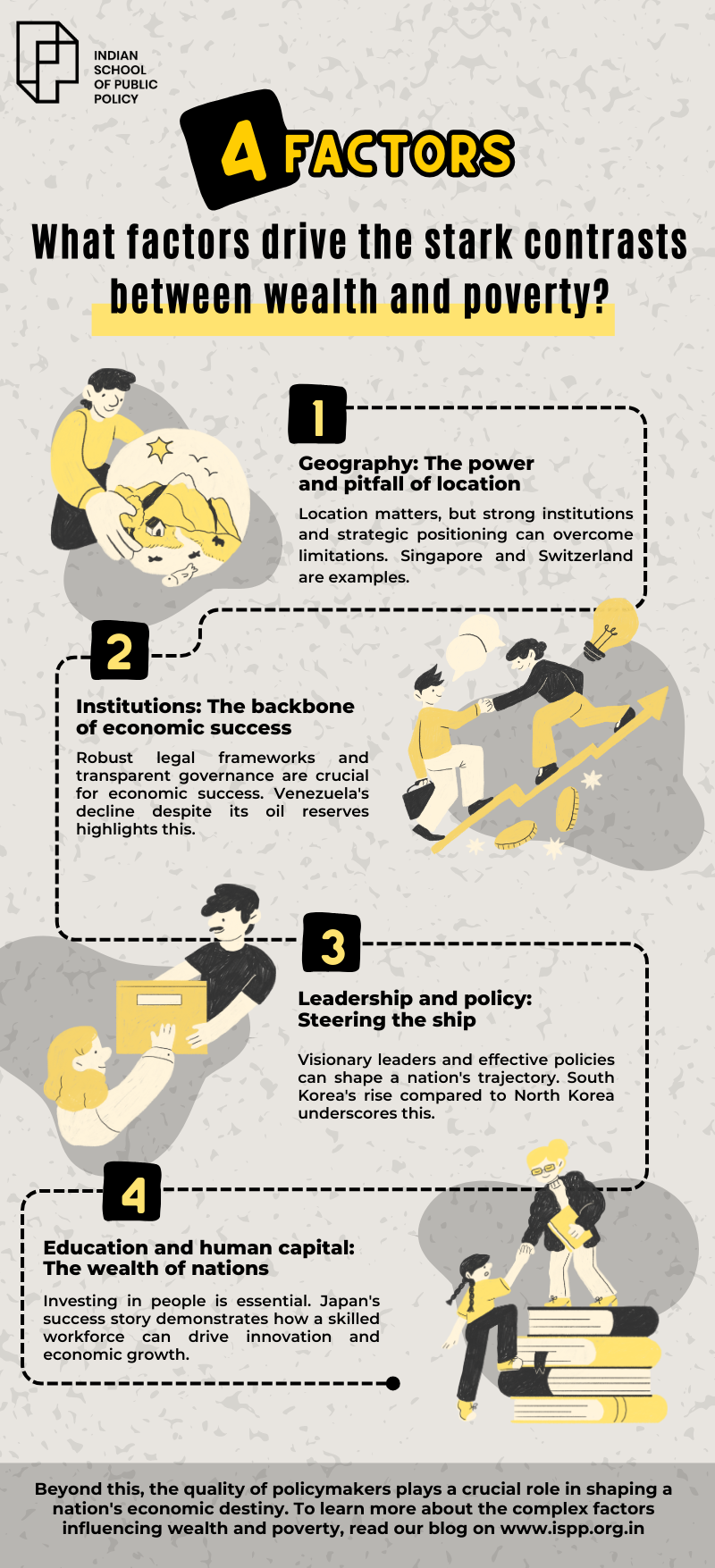
The underlying factors behind the wealth and poverty of nations

The presence of extreme poverty in numerous developing nations poses a pressing challenge that urgently needs attention due to its negative impact on human well-being. This issue is evident through inadequate food and nutrition, insufficient shelter, limited access to safe drinking water, low literacy rates, high infant and maternal mortality rates, elevated unemployment levels, and a pervasive sense of vulnerability and disempowerment. In this blog, we will explore poverty alleviation, its causes, poverty reduction measures by the government, and how there is a dire need for highly qualified and highly skilled policymakers who can craft public policies for poverty reduction and growth in India.
Why do some nations prosper while others struggle?
Why do some nations flourish while others face seemingly endless poverty? Why is it that a country rich in natural resources like oil, gold, or diamonds can remain economically unstable, while a nation lacking in such resources thrives? What factors drive the stark contrasts between wealth and poverty? These are questions that have puzzled economists, historians, and policymakers for centuries. And while the answers are complex, they all point to an undeniable truth: a nation’s success or failure is influenced by a mix of geography, governance, institutions, and human capital. But how exactly do these elements play out in the real world?
What factors drive the stark contrasts between wealth and poverty?
Geography: The power and pitfall of location
Many theorists argue that geography plays a crucial role in determining a nation’s wealth. Countries with access to navigable rivers and seas have historically thrived due to easier trade routes.
| Example – The rise of the British Empire was largely facilitated by its island geography, which allowed it to control maritime trade. Similarly, Singapore, despite its small size and lack of natural resources, has leveraged its strategic location at the crossroads of major global shipping lanes to become one of the wealthiest nations per capita.In contrast, landlocked countries like Chad or Nepal face additional challenges in terms of accessing global markets, which can stifle economic growth. However, geography is not destiny. While it plays a foundational role, it is only one piece of the puzzle. |
Institutions: The backbone of economic success
At the heart of wealth creation lies the strength of a nation’s institutions. The rule of law, property rights, and a transparent judicial system are critical for fostering an environment where businesses can thrive.
| Example – In countries like Switzerland, where institutions are robust, individuals and businesses feel secure to invest, innovate, and expand. This stability has contributed to the country’s consistent ranking as one of the world’s most competitive economies.On the other hand, in countries where corruption is rampant and institutions are weak, like Venezuela, economic decline is almost inevitable, despite possessing one of the world’s largest oil reserves. The absence of sound governance, transparency, and accountability can push a nation into a spiral of poverty, regardless of its natural wealth. |
Leadership and policy: Steering the ship
A key differentiator between prosperous and impoverished nations is the quality of leadership and the policies they implement.
| Example – Take South Korea and North Korea as an example. Both nations share a common history and culture, yet South Korea is now one of the wealthiest nations in Asia, while North Korea remains among the poorest. This disparity is largely due to differences in governance. South Korea’s focus on education, innovation, and global trade has propelled it into the ranks of the world’s most developed countries. In contrast, North Korea’s authoritarian regime, isolationism, and disregard for economic freedoms have led to its economic stagnation. |
Policymakers have the power to influence the trajectory of a nation’s economy, and their decisions can either set the stage for success or plunge a country into crisis. Countries that invest in education, infrastructure, and healthcare often see long-term growth. Conversely, those who neglect these critical areas face economic and social decay.
Education and human capital: The wealth of nations
While natural resources can provide a temporary boost to a nation’s economy, the real wealth of a country lies in its people. Nations that invest in education, skill development, and healthcare tend to outperform those that don’t.
| Example – Consider Japan, a country with limited natural resources, yet it boasts one of the largest economies in the world. Japan’s investment in education and human capital has allowed it to become a global leader in technology and innovation.In contrast, countries with abundant natural resources but poor educational systems often fall into the “resource curse,” where wealth from resources leads to economic mismanagement and corruption rather than development. Nigeria, rich in oil, continues to struggle with widespread poverty due to a lack of investment in human capital and infrastructure. |
There’s more…
Beyond geography, institutions, leadership, and human capital, there’s another crucial factor that shapes the wealth and poverty of nations: the individuals behind these elements – the policymakers. It’s the skill, vision, and commitment of these policymakers that ultimately drive the formulation and execution of impactful strategies. These leaders have the power to shape a nation’s future by designing policies that foster economic growth, promote social welfare, and protect the environment. Highly qualified and experienced policymakers can steer a nation toward stability and prosperity, while ineffective governance often leads to stagnation or decline.
| Example: Rwanda’s remarkable transformation Rwanda provides a powerful example of how skilled policymakers can change the fortunes of a nation. In the aftermath of the 1994 genocide, Rwanda was one of the poorest countries in the world. However, through strategic policy interventions focused on governance, healthcare, education, and technology, Rwanda has transformed into a stable, rapidly growing economy. The leadership’s commitment to public policy reforms has played a crucial role in its development, making Rwanda a model for other developing nations. |
What is the role of policymakers in shaping the future of a country?
Policymakers play a crucial role in shaping a nation’s economic and social outcomes by creating and implementing strategies that address key issues like infrastructure, education, healthcare, and governance. Through well-crafted policies, they can influence how resources are allocated, ensure the establishment of strong institutions, and guide the direction of development. Effective policy makers anticipate future challenges, foster innovation, and create conditions that promote long-term economic growth and social stability. In India, transformative policies like the Green Revolution and 1991 economic liberalisation illustrate how skilled leadership can elevate a nation’s prosperity and global standing.
Given the complexity and importance of policy making, it’s clear that these roles require deep expertise and a strategic mindset. Aspiring public policy professionals who wish to make a positive impact on society must pursue formal education to gain the necessary insights and tools for effective governance.Leading institutes like the Indian School of Public Policy (ISPP) offer programmes like the Post Graduate Programme in Public Policy, Design & Management specially designed for the aspirants hardwired to make an impact in the public policy sphere.
Crafted to focus on skills, ethics, and leadership, the programme offers a balanced approach to mastering both theory and practice. The curriculum blends academic learning with practical skill development, hands-on application, and comprehensive leadership and management training. It encompasses a range of foundational, core, and complementary courses that ensure a well-rounded educational experience.
Take a look at ISPP’s PDM curriculum.
Here’s what Shiksha Dahiya has to say about the educations and her experience at ISPP!
As the world becomes more interconnected and challenges more global, the need for competent and visionary policymakers has never been greater. This programme by ISPP provides a holistic understanding of public policy, equipping students with the skills needed to navigate complex governance challenges.
Apply now!
Infographics:

Register your Interest to Study at ISPP
FAQS
What are the key factors influencing the wealth of nations?
Geography, institutions, leadership, and human capital play crucial roles in determining a nation’s wealth.
How does geography affect a nation’s prosperity?
Nations with strategic access to trade routes, like Singapore, tend to prosper, while landlocked countries face more economic challenges.
Why are institutions important for economic success?
Strong institutions foster transparency, the rule of law, and stability, which are essential for economic growth.
How can policymakers influence the economic trajectory of a nation?
By implementing sound policies focused on education, healthcare, and infrastructure, policymakers can drive long-term growth.
Why is formal education important for public policy aspirants?
Formal education provides the insights, skills, and training necessary for effective governance, helping aspirants make a meaningful impact.


